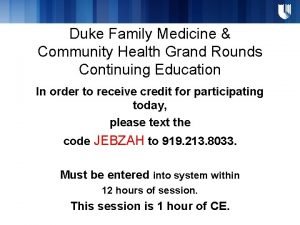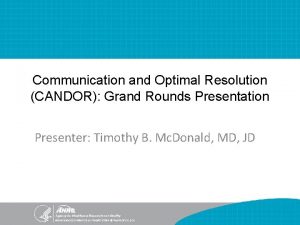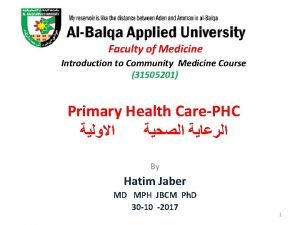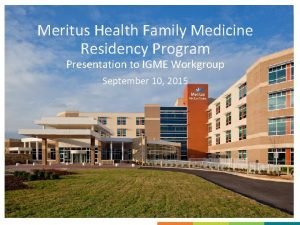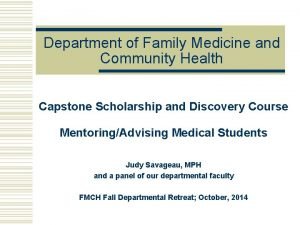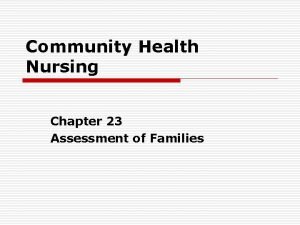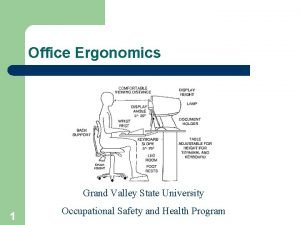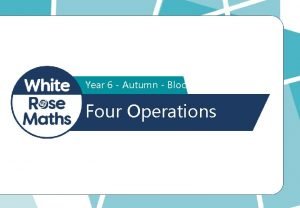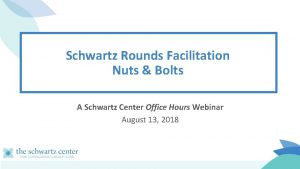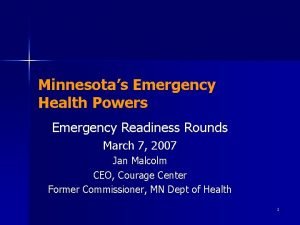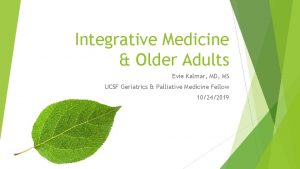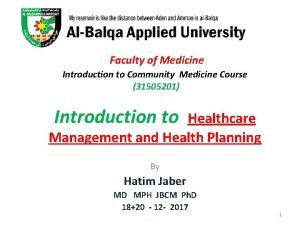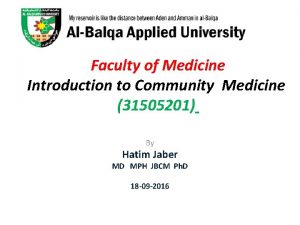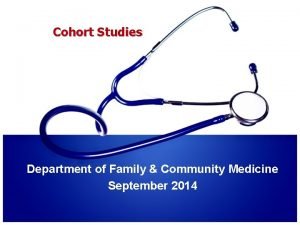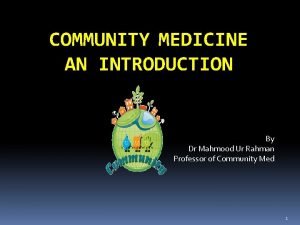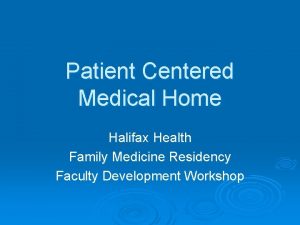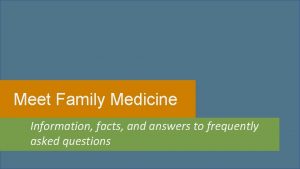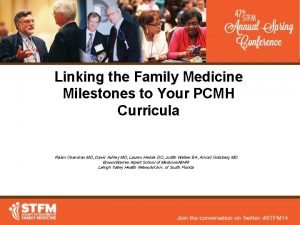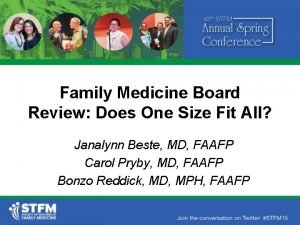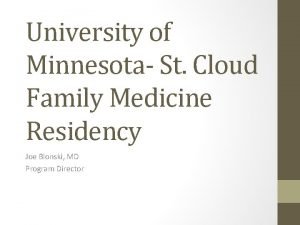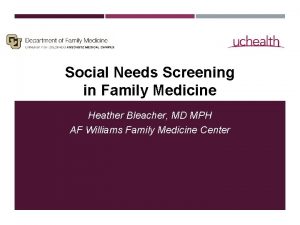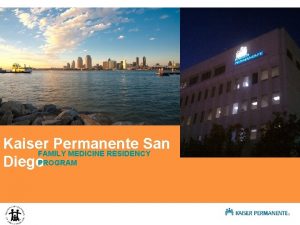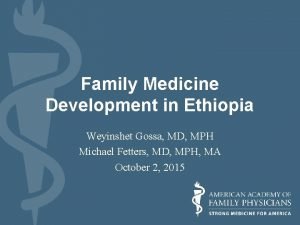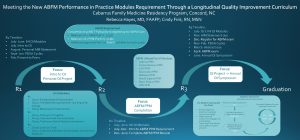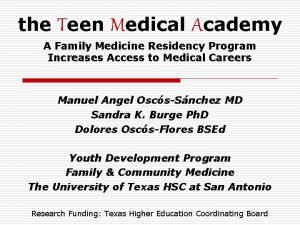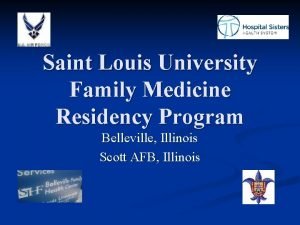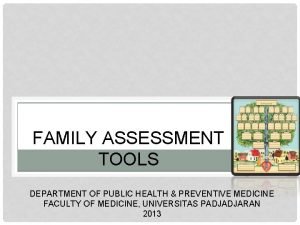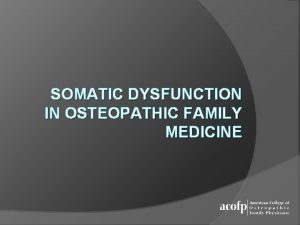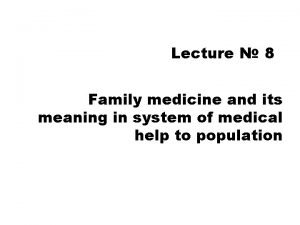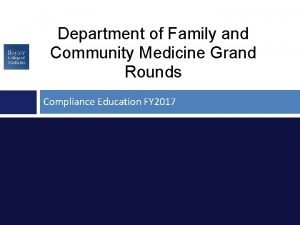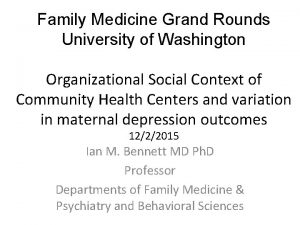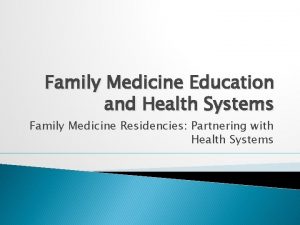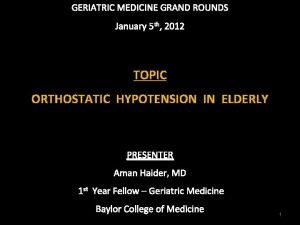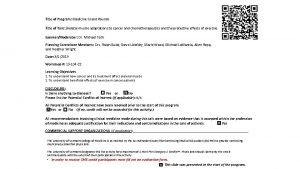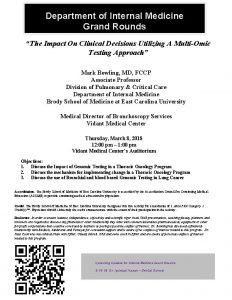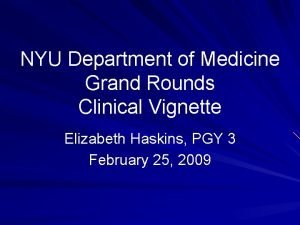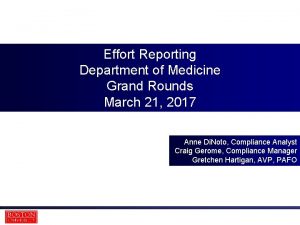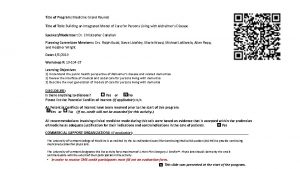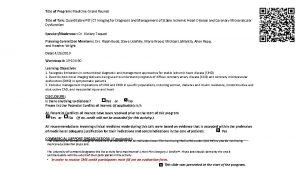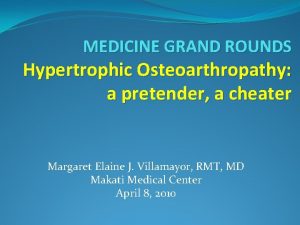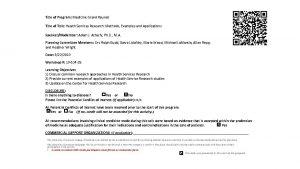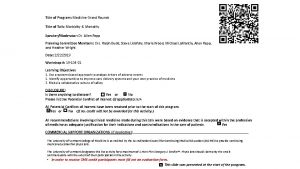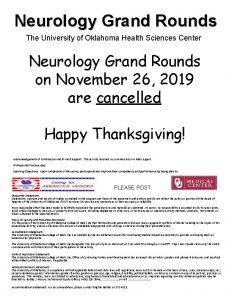Duke Family Medicine Community Health Grand Rounds Continuing





















































- Slides: 53

Duke Family Medicine & Community Health Grand Rounds Continuing Education In order to receive credit for participating today, please text the code JEBZAH to 919. 213. 8033. Must be entered into system within 12 hours of session. This session is 1 hour of CE.

Duke Health Government Relations Update Catherine Liao, MSPH Associate Vice President Family Medicine and Community Health Grand Rounds September 8, 2020

116 th Congress - Senate • 53 Republicans • 45 Democrats • 2 Independents Majority Leadership: Majority Leader: Mitch Mc. Connell (R-KY) Majority Whip: John Thune (R-SD) Conference Chair: John Barrasso (R-WY) Conference Vice Chair: Joni Ernst (R-IA) Minority Leadership: Minority Leader: Chuck Schumer (D-NY) Minority Whip: Dick Durbin (D-IL) Assistant Leader: Patty Murray (D-WA) Policy Committee Chair: Debbie Stabenow (D-MI)

116 th Congress - House (as of July 2020): • • Majority Leadership: Speaker Nancy Pelosi (D-CA) Majority Leader: Steny Hoyer (D-MD) Majority Whip: Jim Clyburn (D-SC) Caucus Chair: Hakeem Jeffries (D-NY) Minority Leadership: Minority Leader: Kevin Mc. Carthy (R-CA) Minority Whip: Steve Scalise (R-LA) Conference Chair: Liz Cheney (R-WY) Conference Vice Chair: Mark Walker (R-NC) 232 Democrats 198 Republicans 1 Libertarian (Rep. Amash) 4 vacancies

New congressional maps for 2020 elections

116 th Congress Agenda q MUST DOs q Unemployment Insurance (July 31) q Paycheck Protection Program (August 8) q FY 2021 Appropriations (September 30) q FY 2021 National Defense Authorization (Sept. 30) q Health extenders (November 30) q WOULD LIKE TO DOs q Police reform q Surprise billing q Drug pricing q Infrastructure 6

Emergency Federal Funding • Phase One – Coronavirus Preparedness and Response Supplemental Appropriations Act (March 6, 2020) • $8. 3 billion ($2. 2 billion for CDC; $836 million for NIH; telehealth waiver authority) • Phase Two – Families First Coronavirus Response Act (March 18) • $192 billion (eliminate patient cost-sharing for testing; paid sick leave; unemployment insurance; 6. 2% Medicaid FMAP increase) • Phase Three – CARES Act (March 27) • $2. 2 trillion ($945 million for NIH; $100 billion for hospitals/providers, 20% Medicare DRG add on) • Interim Relief / Phase 3. 5 – Paycheck Protection Program and Health Care Enhancement Act (April 24) • $484 billion ($75 billion for hospitals/providers; $1. 8 billion for NIH; $25 billion for testing to states; $320 billion for small business loans)

HEROES Act (HR 6800) • House Democrats’ “Phase Four” $3 trillion stimulus and recovery response proposal includes: • $100 billion for hospitals and providers • $4. 7 billion for NIH (including $3 billion to offset costs related to reductions in lab productivity) • $75 billion for testing and contact tracing • Nearly $1 trillion for state and local government relief • Passed the House along party lines on May 15, 2020 • Will not receive a vote in the Senate

HEALS Act • Senate Republicans’ “Phase Four” $1. 1 trillion stimulus and recovery response proposal includes: • Federal liability protections for businesses, schools, and universities/colleges • $25 billion for hospitals and providers • $15. 5 billion for NIH (including $10. 1 billion to offset costs related to reductions in lab productivity) • $25 billion for testing and contact tracing • Extension of current telehealth policies and reimbursements through 2021 or the end of the public health emergency, whichever is later • Creates two repayments plan: 10 -year standard and incomedriven repayment plan

Delivering Immediate Relief to America’s Families, Schools and Small Businesses Act • Federal liability protections for non-profits, hospitals, churches, schools, and businesses • Unemployment insurance • Small business recovery • Funding for the US Postal Service • $16 billion for testing, contact tracing, surveillance • $29 billion for vaccine, therapeutics, and diagnostic development, as well as vaccine distribution

April 30 Interim Final Rule • Greater billing and payment flexibility for Medicare and Medicaid patients and providers in the current public health emergency, retroactive to March 1, 2020. • Teaching hospitals • Can claim credit for residents redeployed to other hospitals • Physicians can direct and review residents’ care via telehealth • Provided coverage for all COVID-19 tests when ordered by any healthcare professional, not just the treating physician • Changed the Medicare Shared Savings Program to provide ACOs with more financial stability • Telehealth • Enhanced payment for telephone-only E/M codes • Expanded the type of health professional that can deliver Medicare services via telehealth (SLP, PT, OT) https: //www. cms. gov/files/document/covid-medicare-and-medicaid-ifc 2. pdf

Telehealth and COVID-19 • Unprecedented expansion of telehealth access and services through at least the end of the public health emergency* • March 17, 2020 – DEA temporarily suspends the Ryan Haight Act requirement for the duration of the health emergency that a provider conduct an initial, inperson examination before electronically prescribing a controlled substance • CMS has provided waivers and guidance for over 80 additional telehealth services, including: • Easing federal licensing restrictions (state regulations still supersede) • Waiving originating site requirements • Expanding the use of remote patient monitoring • Expanding the use of telephone-only visits for certain services • Removing limitations on the number of times certain services can be provided via telehealth • Expanding areas of practice for telehealth visits • NC Governor Roy Cooper issued an Executive Order that temporarily waives NC licensure requirements (subject to reciprocity)

Telehealth Legislation Protecting Access to Post COVID-19 Telehealth Act of 2020 (H. R. 7633)* • House Telehealth Caucus legislation – Reps. Thompson (D-CA), Johnson (R-OH), Matsui (D-CA), Schweikert (R-AZ), Welch (D-VT) – Would remove geographic originating site restrictions; make the home an eligible originating site; ensure federally qualified health centers and rural health centers can furnish telehealth services; and make permanent the temporary waiver authority for the Secretary of Health & Human Services for future emergencies Other Notable Legislative Efforts • HEALS Act – Senate Republican COVID-19 relief proposal – Would extend all current waivers and flexibilities through 2021 or the end of the public health emergency, whichever is later • Telehealth Modernization Act (S. 4375) – Sen. Alexander (R-TN) – Would make permanent allowing the home to be an originating site for telehealth services; make permanent telehealth expansion in rural areas; provide HHS with authority to make other flexibilities permanent • CONNECT Act (H. R. 4932 / S. 2741) – Would allow CMS to waive certain restrictions in high need areas; expand access to mental health services; provide CMS with greater waiver authority in emergencies • Evaluating the Disparities and Outcomes of Telehealth During the COVID-19 Emergency (EDOT) Act (H. R. 7078) – Rep. G. K. Butterfield (D-NC-01) original cosponsor – Would require CMS to submit a report identifying health disparity information pulled from reported COVID-19 telehealth response data

CMS and Telehealth: Looking Ahead CY 2021 Physician Fee Schedule Proposed Rule • For the telehealth flexibilities CMS may extend without congressional approval, the PFS has three categories: – Services to permanently add for Medicare coverage now and after the PHE (e. g. – home health for established patients, E/M visit complexity code, prolonged services) – Services to be added for Medicare coverage at least through the end of the PHE (e. g. – emergency department visits levels 1 -3, nursing facilities discharge management, domiciliary, rest home, or custodial care services for established patients) – Services that CMS is currently not recommending be made permanent at the end of the PHE but is seeking comment to make a final determination (e. g. – home health for new patients, physical and occupational therapy services, initial nursing facility visits) Comments due October 5, 2020. CY 2021 PFS - https: //www. cms. gov/files/document/cms-1734 -ppdf. pdf (Full list of telehealth proposals on pg. 106) 14

Telehealth and Government Relations • • • Work with other health systems, stakeholders, and professional associations, including the American Telemedicine Association, Alliance for Connected Care, e. Health Initiative, and The Academy Advisors Partnership with the Duke Telehealth Office Connect Duke experts and clinicians with congressional leaders and committee staff: – – – • NC Congressional delegation* House Ways and Means Committee* Senate Finance Committee* Senate Health, Education, Labor, and Pensions Committee* House Energy and Commerce Committee* House and Senate Telehealth Caucuses* Virtual Congressional briefing with Rep. G. K. Butterfield (D-NC-01) on Duke’s telehealth experience on August 19, 2020* Resources - https: //govrelations. duke. edu/issues/federal-issues#4 • Regulation v. Legislation (American Hospital Association) • Recommended Telehealth Flexibilities to be Made Permanent (American Telehealth Association) 15

Social Drivers of Health Before COVID-19: social determinants of health was an increasing focus for Congress • Bipartisan support • First bill: “Social Determinants Accelerator Act of 2019” • Several briefings on the issue, but hard to tackle During COVID-19: a national crisis in health equity exacerbated by social determinants of health • Several House hearings to address growing disparities: • “The Disproportionate Impact of COVID-19 on Communities of Color” • "Health Care Inequality: Confronting Racial and Ethnic Disparities in COVID-19 and the Health Care System" • "Pollution and Pandemics: COVID-19's Disproportionate Impact on Environmental Justice Communities"

Maternal Health • Several bills introduced to improve maternal health and reduce maternal mortality – Rep. Butterflied: the “Data Mapping to Save Moms’ Lives Act” – Rep. Adams: the “Black Maternal Health Momnibus” • Government Relations has been connecting Duke Health experts to Congressional offices to inform policy discussions • Maternal Health Bill Tracker https: //www. nationalpartnership. org/ourwork/resources/health-care/federal-legislation-to-improve-maternalhealth. pdf • Expect this issue to be a focus if there’s a change in the Administration

Vaccine Distribution Growing concern around vaccine distribution to underserved communities. Will it be available? Will it be affordable? Will it be trusted?

LGBTQ+ Health June 2020 US Supreme Court affirmed legal employment protections to prevent discrimination for LGBTQ+ individuals. August 2020 A federal judge froze the Trump administration's rollback of Obama-era anti-discrimination protections that include transgender people. – HHS originally finalized a rule that would have rolled back transgender protections on June 12, 2020 – Appeal from the Administration is pending

Workforce and Medical Education • Congress continues to consider policies that would improve access to care in underserved areas. • Congress continues to invest in HRSA programs to support a robust workforce. • Advocacy to increase Medicare GME slots is strong. – Reintroduction of bills to increase slots by 15, 000 – The “Opioid Workforce Act” would provide 1, 000 additional slots for addiction medicine, addiction psychiatry, or pain management • Efforts to ease student loan burden during COVID-19 • Loan forgiveness bill introduced for healthcare workers treating COVID-19 patients.

Federal Priorities for Physician Assistants • Home Health Care Planning Improvement Act (S. 296 / H. R. 2150) – Included in the CARES Act – Permanently authorized PAs and NPs to order home healthcare services for Medicare patients (in a manner consistent with state law). • • Physician Assistant Direct Payment Act (S. 596 / H. R. 1052) Promoting Access to Diabetic Shoes Act (S. 237 / H. R. 808) ACO Assignment Improvement Act (H. R. 900) Increasing Access to Quality Cardiac Rehabilitation Care Act (S. 2842 / H. R. 3911) • Mainstreaming Addiction Treatment Act (S. 2074 / H. R. 2482) *Priorities identified by AAPA

Faculty Engagement

Immigration Administration Congress Executive Orders/Proclamations • April 22 • Suspends green card processing (now through 12/31/2020) • May 29 • Restricts students from China with ties to the Chinese “Military-Civil Fusion Strategy” from obtaining F or J visas to study or conduct research in U. S. • June 22 • Suspends issuance of NEW H-1 B, H -2 B, H-4, and certain J and L visas through 12/31/20 • Does not apply to J-1 Scholar visa or J-1 Alien Physician visa • Agency Guidance • SEVP Fall 2020 – Would not have allowed international students to remain in U. S. to take online only courses (related to COVID closures) • Rescinded after lawsuit • Duke joined brief in support • Over 750 immigration-related bills in Congress • Not all are restrictive 0 become law without bipartisan agreement between Congress and the White House The Courts • • Federal challenges pending or filed to the May 29 proclamation and June 22 order. Deferred Action for Childhood Arrivals (DACA) • Supreme Court ruled in June that Trump Administration plan to end DACA was invalid. • Administration is not processing any NEW DACA applicationsonly renewals

Government Relations Response • Urging congressional support for academic medicine • How will $26 billion support the research workforce and core facilities? • How will $175 billion assist hospitals and provider practices? • Regular resource via phone/email/Zoom to Congressional staff on COVID-19 patient care and research, impacts on all other research, testing, PPE, surge planning, financial impacts, workforce needs, data reporting • Connecting Duke experts with Congressional staff and committees • Letters from Duke Health leadership on invoking the Defense Production Act and in support of AMCs • Requesting congressional support for sign-on letters • Promoting activities with national associations • Regular federal updates to Duke Health leadership

Addressing COVID-19 will continue to be a top priority • Continue efforts to protect and reimburse providers • Continue efforts to protect the research enterprise • Addressing health disparities among racial and ethnic populations FY 2021 appropriations work must be completed by October 1 Other issues we are monitoring for year-end action • Telehealth • Drug pricing • Surprise billing • Proposed cuts to Medicaid Fall schedule • Appropriations • Additional COVID-19 relief

QUESTIONS?

Duke Family Medicine & Community Health Grand Rounds Continuing Education In order to receive credit for participating today, please text the code JEBZAH to 919. 213. 8033. Must be entered into system within 12 hours of session. This session is 1 hour of CE.

Duke Family Medicine & Community Health Grand Rounds • In order to receive credit for participating Continuing Education today, • please text the • code JEBZAH to 919. 213. 8033. • Must be entered into system within • 12 hours of session. • This session is 1 hour of CE.

Family Medicine & Community Health Grand Rounds North Carolina GR Update • • Doug Heron Associate Vice President Duke State Relations Duke University, Duke Health and Duke Life. Point Healthcare

DIVIDED GOVERNMENT SINCE 2016 = Cooper (D) defeats Mc. Crory (R)


NC House of Representatives (72)

North Carolina Senate (30)

2019 -20 Session: What Should Happen • • Convene January 2019 for the “Long Session” Enact a 2 Year State Budget Major legislation enacted centered on policy objectives Adjourn sometime in July or August • Interim Period 2019 -20 • Study and Oversight Committees • Develop legislation for the 2020 Short Session • “Short Session” - April 28, 2020 • Revise State Budget enacted during the long session • Adjourn Sine Die • 2020 election • All 170 NCGA seats (2 year terms) • Governor, Lt. Governor, etc.


36

What Did Happen = 2020 Short Session(s) • Interim House Select Committee on COVID-19 Response • 4 Subgroups / Legislative recommendations • *Senate had no formal process • April 28 th – May 2 nd • COVID-19 Response – Phase 1 • $1. 6 B appropriated from CARES Act ($4 B to NC) • May 18 th – June 26 th • “Normal” short session • Mini budgets in lieu of appropriations act / lack of clarity on outlook • Appropriations of additional CARES Act $ • September 2 nd • COVID-19 Response – Phase 2

2020 COVID-19 RECOVERY ACT Appropriations and Policy “Phase 1” $3 B

Appropriations to Duke Health and DLP Hospitals • $15 M Teaching Hospitals Relief Fund* • Duke University Hospital = $3 M • $15 M Non-teaching Hospitals Relief Fund* • Duke Raleigh Hospital = $410, 000 / Duke Regional Hospital = $311, 000 • $65 M Rural Hospital Relief Fund* • Central Carolina $816, 000 / Frye $209, 000 / Haywood $ 107, 000 / Harris $798, 000 / Maria Parham $950, 000 / Person $ 476, 000 / Rutherford Regional $686, 000 / Swain $450, 000 / Wilson $1. 1 M (Total = ~ $5. 6 M) • - no double-dipping • $15 M to the Duke Human Vaccine Institute* • Vaccine development / Dr. Bart Haynes

5% increase in the Medicaid Fee-For-Service rates* Effective 3/1/20, and will expire on the earlier of: (i) the date the nationwide COVID-19 public health emergency expires, (ii) the date the NC State of Emergency is rescinded, or (iii) 3/31/21. Medicaid coverage for COVID-19 testing For the uninsured / Does not extend coverage for treatment $29 M for COVID-19 research initiatives Community testing and countermeasure development Administered by the UNC Collaboratory $25 M for COVID-19 testing, contact tracing, and trends tracking and analysis Appropriated to and administered by NCDHHS In exchange, NCDHHS has to increase data sharing

$20 M in flexible funds: Allowable uses include: increasing nursing capacity, increasing the number of community health workers, expanding telehealth services, providing infection control support and training in nursing homes and adult care homes, and diverting behavioral health emergencies from EDs. $50 M to provide funds for rural and underserved communities especially hard hit by the COVID– 19 pandemic. To support health provider grants, targeted Medicaid assistance for rural hardship grants to nonhospital providers, enhanced Telehealth services, transportation for critical services, health care security for the uninsured, the Office of Minority Health, and related items. $50 M for the purchase of PPE* 50% to the North Carolina Healthcare Association for hospitals $20 M Private College COVID-19 Relief Fund* Duke University - $500, 000

Policy Provisions • Broad liability protection for healthcare providers* Provides facilities and providers with immunity from civil liability associated with decisions or activities in response to or as a result of the COVID-19 pandemic (absent gross negligence, reckless misconduct, or intentional infliction of harm) • *Left about $1. 5 B CARES Act Funds unspent

2020 COVID-19 RECOVERY ACT “Phase 2” A $1. 1 B Christmas Tree September 2 nd & 3 rd


Key Provisions/Appropriations • COVID Vaccine: $2 M to DHVI to cover rapid, low-cost COVID-19 testing. • Uninsured: $20 M to DHHS to establish the NC COVID-19 Provider Relief Fund to reimburse providers enrolled in the Medicaid program for costs incurred for treatment to uninsured patients during the COVID-19 pandemic; additional $5 M to NC Med. Assist to cover increased costs for providing prescription assistance services during the COVID-19 emergency to individuals who are indigent or uninsured. • Independent Physician Practices: $25 M to the North Carolina Medical Society to be distributed to independent medical practices with demonstrable financial needs related to COVID-19. • Behavioral Health: $38 M to provide an additional lump sum allocation of single stream funds to the LME/MCOs.

Key Provisions/Appropriations • Post-Acute Testing: $9. 6 M each to the nonprofit organizations known as NC Senior Living Association, NC Health Care Facilities Association, and NC Assisted Living Association, to purchase COVID-19 tests for distribution to their member facilities. • Post-Acute PPE: $23 M for distribution in equal amounts to North Carolina Senior Living Association, North Carolina Health Care Facilities Association, and North Carolina Assisted Living Association to purchase and distribute, free of charge, to their member facilities (i) certain necessary supplies and equipment and (ii) personal protective equipment.

2020 Short Session (May 18 th – June 26 th) • No State Budget in Place • • Operating on the last approved certified state budget Enacted a series of “mini budgets” to fund agencies and priorities Reluctance to spend $ due to projected shortfalls ($4. 5 B of $24 B) Unemployment (1. 1 M new claims) • Fight Over Plans to Reopen NC • Partisan disagreement • 7 bills sent to the Governor: ALL vetoed and failed to override • Masking – the perfect example of the divide

What Got Done / What Didn’t Get Done • Coronavirus relief $$ • Medicaid expansion* • Liability reform / protection • Telehealth reform* • Medicaid rebase • Medicaid transformation • Certificate of Need • Practice authority • Mandates on care


• Potential Implications of the 2020 Election – North Carolina General Assume Governor Cooper Wins Reelection Assembly • Democrats Need to Pickup 5 Seats in the Senate & 6 in the House • Medicaid Expansion / Minimum Wage / Teacher Raises / Grow Government / Environmental Regulations / School Choice Reform / State Health Plan Reform • Republicans Hold = More of the Same • Medicaid Expansion / Further Tax Reform / Business Friendly Climate / • School Choice / Regulatory Reform • A Split General Assembly = Gridlock


QUESTIONS? • Doug Heron, Associate VP • Duke State Relations • doug. heron@duke. edu / 919 -889 -8009 • @dukestategovrel

Duke Family Medicine & Community Health Grand Rounds • In order to receive credit for participating Continuing Education today, • please text the • code JEBZAH to 919. 213. 8033. • Must be entered into system within • 12 hours of session. • This session is 1 hour of CE.
 Duke medicine grand rounds
Duke medicine grand rounds Utmb grand rounds
Utmb grand rounds Nursing grand rounds presentation example
Nursing grand rounds presentation example Types of family in community medicine
Types of family in community medicine Elements of primary health care
Elements of primary health care Meritus health family medicine residency
Meritus health family medicine residency Bladen community college continuing education
Bladen community college continuing education Similar pic
Similar pic Duke translational medicine institute
Duke translational medicine institute Family and community health advisor
Family and community health advisor Family care plan in community health nursing
Family care plan in community health nursing Grand valley state university occupational therapy
Grand valley state university occupational therapy Occupational health nurse roles and responsibilities
Occupational health nurse roles and responsibilities 235 rounded to the nearest ten
235 rounded to the nearest ten Christmas table quiz seomra ranga
Christmas table quiz seomra ranga Tabular dimensioning
Tabular dimensioning 5 layers of neurosis
5 layers of neurosis A is an odd number which rounds to 100 000
A is an odd number which rounds to 100 000 Maintenance rounds
Maintenance rounds Schwartz rounds facilitator training
Schwartz rounds facilitator training Sam rounds
Sam rounds Quality teaching rounds coding sheet
Quality teaching rounds coding sheet Red white and blue tortilla chips
Red white and blue tortilla chips Readiness rounds
Readiness rounds Breech face
Breech face Harvard instructional rounds
Harvard instructional rounds Duke wheel of health
Duke wheel of health Lead time in community medicine
Lead time in community medicine Lead time in community medicine
Lead time in community medicine Objectives of school health programme
Objectives of school health programme Introduction to community medicine
Introduction to community medicine Concepts of health and disease
Concepts of health and disease Cohort study community medicine
Cohort study community medicine Seqs community medicine
Seqs community medicine Principles of family medicine
Principles of family medicine Halifax family medicine residency
Halifax family medicine residency Family medicine fellowship
Family medicine fellowship Milestones family medicine
Milestones family medicine Board review family medicine
Board review family medicine Define family medicine
Define family medicine Shelf exam percentiles
Shelf exam percentiles Ecogram example
Ecogram example St cloud family medicine
St cloud family medicine Af williams clinic
Af williams clinic Kaiser san diego family medicine residency
Kaiser san diego family medicine residency Family medicine in ethiopia
Family medicine in ethiopia Cabarrus family medicine concord
Cabarrus family medicine concord Uthscsa internal medicine residents
Uthscsa internal medicine residents St louis family medicine residency
St louis family medicine residency Family apgar
Family apgar 10 principles of family medicine
10 principles of family medicine Isu family medicine
Isu family medicine Somatic dysfunction in osteopathic family medicine
Somatic dysfunction in osteopathic family medicine Family medicine meaning
Family medicine meaning
